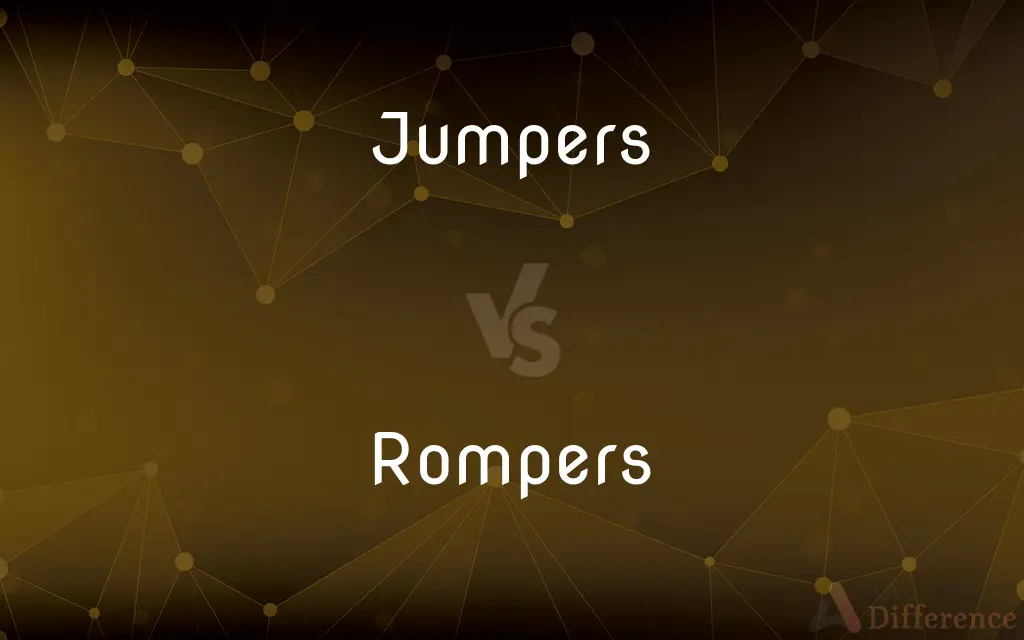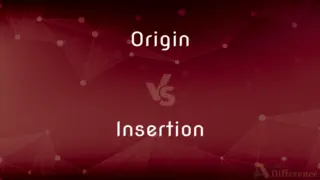Jumpers vs. Rompers — What's the Difference?
By Tayyaba Rehman — Updated on October 4, 2023
Preclude means to prevent something or make it impossible, while Exclude means to deliberately leave out or not include something.

Difference Between Jumpers and Rompers
Table of Contents
ADVERTISEMENT
Key Differences
Preclude and Exclude are two terms that, while related, differ in their specific applications. To preclude is to prevent the possibility of an event or action from occurring, often in advance. It has a proactive connotation. On the other hand, to exclude is to intentionally leave out or bar something or someone from a particular group or activity.
The term Preclude often implies an action taken in anticipation. It emphasizes prevention. For example, security measures can preclude the possibility of a breach. In contrast, Exclude emphasizes the act of omission, often after considering all possibilities or options. For instance, a person can be excluded from a guest list.
From a grammatical perspective, both Preclude and Exclude are verbs. However, their usage can vary based on context. When someone says an action precludes another, it means the first action prevents the second from happening. When someone excludes an item, they're deliberately leaving it out or not including it.
One can think of Preclude as dealing more with potential futures or possibilities, while Exclude deals more with present decisions or situations. For example, a lack of qualification might preclude someone from getting a particular job. However, if a person isn’t selected for a role because of not meeting the criteria, they are excluded from the position.
In summary, while Preclude and Exclude both denote prevention or omission, they differ in the timing and intent behind their usage. Preclude involves preventing something in advance, while Exclude focuses on a deliberate act of leaving out.
ADVERTISEMENT
Comparison Chart
Primary Meaning
Prevent from happening
Deliberately leave out
Timing
Often anticipatory
Typically present or after-the-fact
Connotation
Proactive prevention
Act of omission
Example Usage
"His injury precluded him from playing."
"She was excluded from the team."
Focus
On potential futures or possibilities
On present decisions or situations
Compare with Definitions
Jumpers
Prevent from happening.
The rain precluded our plans for a picnic.
Rompers
Deliberately not provide.
The insurance policy excludes certain conditions.
Jumpers
Make impossible.
His tight schedule precluded any chance of a break.
Rompers
Prevent from entering; keep out.
Pets are excluded from the restaurant.
Jumpers
Rule out in advance.
Her prior commitments precluded her attendance.
Rompers
Bar from participation.
He was excluded from the meeting.
Jumpers
Stop something from being considered.
The evidence precludes any other interpretation.
Rompers
Remove from a set or group.
The outlier was excluded from the data set.
Jumpers
Eliminate the possibility of.
His contract precludes him from negotiating with other teams.
Rompers
Leave out of consideration.
Certain items were excluded from the list.
Jumpers
One that jumps.
Rompers
One that romps.
Jumpers
A type of coasting sled.
Rompers
Also rompers Any of various one-piece garments, often having short gathered legs, for infants or children.
Jumpers
(Electricity) A wire or cable used temporarily to complete a circuit or to bypass a break in a circuit.
Rompers
A jumpsuit that has shorts.
Jumpers
(Basketball) See jump shot.
Rompers
Plural of romper
Jumpers
A saddle horse that has been trained to jump over obstacles.
Rompers
A one-piece garment for babies and small children, consisting of a top and trousers. A romper suit.
He is wearing the last clean rompers I had for him and they are getting dirtier by the minute.
Jumpers
A sleeveless dress or a skirt that has an attached bib and is worn over a blouse or sweater.
Rompers
A one-piece garment for children to wear at play; the lower part is shaped like bloomers
Jumpers
A loose, protective garment worn over other clothes.
Jumpers
Often jumpers A child's garment consisting of straight-legged pants attached to a biblike bodice.
Jumpers
Chiefly British A pullover sweater.
Jumpers
See jumpsuit.
Jumpers
Plural of jumper
Jumpers
A coverall worn by children
Common Curiosities
What is a Jumper?
A jumper is a knitted garment worn over the torso, often for warmth.
Is a Romper suitable for all occasions?
Typically, rompers are casual wear, but some stylish designs can fit semi-formal settings.
What materials are Jumpers made of?
Jumpers can be made of wool, cotton, and synthetic fibers.
How is a Romper defined?
A romper is a one-piece garment that combines a top with shorts.
Can Jumpers be worn in summer?
Lightweight jumpers can be worn in milder climates, including summer evenings.
Are Rompers comfortable?
Rompers are designed for comfort, often being made of breathable materials.
Are Rompers just for women?
While rompers are popular among women, designs are available for men and children too.
Do Jumpers always have long sleeves?
While many jumpers have long sleeves, there are short-sleeved and sleeveless versions too.
Are Jumpers and Sweaters the same?
In American English, "sweater" is commonly used, while "jumper" is more prevalent in British English.
Share Your Discovery

Previous Comparison
Mature vs. Ripe
Next Comparison
Origin vs. InsertionAuthor Spotlight
Written by
Tayyaba RehmanTayyaba Rehman is a distinguished writer, currently serving as a primary contributor to askdifference.com. As a researcher in semantics and etymology, Tayyaba's passion for the complexity of languages and their distinctions has found a perfect home on the platform. Tayyaba delves into the intricacies of language, distinguishing between commonly confused words and phrases, thereby providing clarity for readers worldwide.
















































